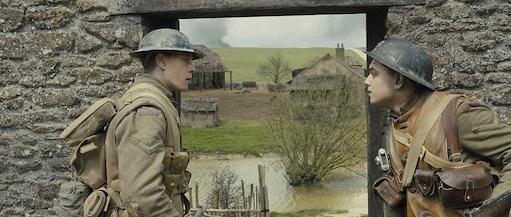|
|
Movie Review: 1917By Matthew HuntleyFebruary 1, 2020
After a while, we become aware we’ve been following Blake and Schofield continuously, without cuts to other characters or establishing shots of the surrounding environment, but this deepens our relationship with them and we genuinely come to care about these “kids” and sometimes can’t believe two people who are so young could find themselves in situations so grim. Editor Lee Smith and cinematographer Roger Deakins do a remarkable job of masking the cuts that sometimes only occur up to eight and a half minutes after following the leads. It can be exhausting but “1917” is meant to be a cautionary tale about the toll war can take on the human mind and body as much as an action drama. The goal of “1917,” and what it achieves, is to throw the audience into the world of Blake and Schofield and to make the abstract concept of war less abstract. It’s an inherently captivating and thrilling experience, made all the more hard-hitting by Dennis Gassner’s expansive production design, which does an especially outstanding job of recreating destroyed towns and disemboweled structures. These striking visuals are underlined by Thomas Newman’s elegiac score, which is comprised of the usual but still powerfully grandiose waves of strings and horns, which get punctuated, to great dramatic effect, by a light, child-like piano theme that accentuates the innocence of the main characters and the idea that when it comes to war, perhaps everyone involved retreats back to their childhood, feeling scared, insecure and trying desperately to navigate a world that’s dangerous, overwhelming and baffling. This is how we feel watching the film and it’s gripping. I’ve given “1917” a lot of compliments, but I’d be remiss if I didn’t also mention its shortcomings, most of which exist at the screenplay level. Mendes has obviously made a very personal film—the fictional story was inspired by one his grandfather, himself a World War I veteran, relayed to him—but I wish he and Cairns had taken greater risks by not setting the plot on such a traditional Hollywood war movie path. Its standard narrative developments and easy emotional payoffs actually undermine the film’s attempt to be visually and atmospherically realistic, which it accomplishes through its technical prowess. One of the scenes I had a hard time believing takes place when Schofield meets a young French woman and her newborn baby. She’s hiding in a blown-out building and her baby is hungry, so it seems overly convenient that Schofield happened to grab exactly what the baby needed in an earlier scene. Don’t get me wrong—this is a touching, sweet moment, and it reminds us of the soldier’s unwavering humanity, but at the same time, it feels too “written,” sentimental and forced, as if the filmmakers thought they were required to strike our emotional chords even if it meant ceasing the urgency of the characters’ situation and succumbing to melodrama. Another extraneous albeit well-acted scene arrives near the end when Schofield hears a fellow soldier singing the gospel song, “Poor Wayfaring Stranger,” and sits quietly beside a tree to listen. Again, this a reflective break from the surrounding madness, but it doesn’t quite fit with the movie’s overall exigent tone. “1917” works masterfully when it focuses on being a brutally pressing and unaffected war picture, but it loses credibility when it tries to be something else, namely a poetic drama or a suspenseful Hollywood thriller, the latter of which is most apparent during the climax when the hero faces one hurdle after another to the point where it becomes overkill. Nevertheless, our admiration for “1917” outweighs our criticism of it. The scope of the film is enormous and Mendes and his team show they’re in complete control of their resources. The nature and subject matter of war movies tend to make them easy to hold in high regard, but that doesn’t make them any easier to pull or less deserving of our respect, and “1917” is one that merits recognition for its visuals, its score, its tempo, and the way it exercises our hearts, minds and viscera all at once. Its narrative inconsistencies hold it back from being a perfect film, but it’s certainly a memorable one.
|

|
|
|

|
Thursday, October 31, 2024
© 2024 Box Office Prophets, a division of One Of Us, Inc.


